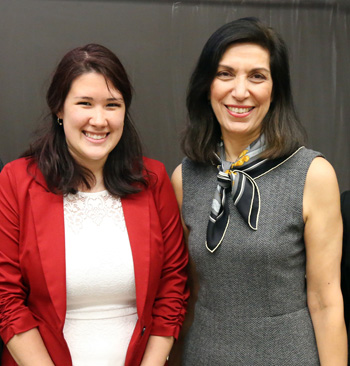When it comes to the brain, levels of molecules involved in neuronal signaling must be “just right,” or things can go terribly wrong.

This, according to Huda Zoghbi, M.D., is the neuropsychiatric equivalent of the “Goldilocks Principle,” a new way to define, explore, and possibly reverse disorders such as Rett syndrome.
Zoghbi, director of the Jan and Dan Duncan Neurological Research Institute at Texas Children’s Hospital in Houston and winner of the 2015 Vanderbilt Prize in Biomedical Science, explained the principle last week during her Vanderbilt Prize lecture.
She is the 10th recipient of the prize, which honors women scientists who have made significant contributions to research and to mentoring other women scientists. As part of her prize, she will mentor the 2015 Vanderbilt Prize Scholar, Lisa Poole, a graduate student in the laboratory of David Cortez, Ph.D.
“Dr. Zoghbi is a pioneer in the genetics and mechanisms of neurodevelopmental and neurodegenerative diseases,” said Larry Marnett, Ph.D., associate vice chancellor for Research at Vanderbilt University Medical Center, in his introductory remarks.
Zoghbi, a professor at Baylor College of Medicine and member of the National Academy of Sciences, began investigating Rett syndrome as a fellow in Pediatric Neurology at Baylor in October 1983, when she encountered a 5-year-old girl who had mysteriously lost the ability to speak, walk and use her hands.
The same week, she read a report that described a new entity, Rett syndrome, with the same characteristics. As the number of cases mounted, “I decided it’s time to go back and figure out what to do about this,” she said.
In 1999, Zoghbi and her colleagues reported that Rett syndrome is caused by mutations in an X-linked gene encoding a protein that regulates other gene expression. The discovery opened up a new field of research into disorders of epigenetic regulation.
Since then, they have pinpointed neurons that mediate various neurological and psychiatric symptoms and, most recently, using a mouse model of Rett syndrome, they showed that deep brain stimulation of a specific neural network improved learning and memory.
This is how Zoghbi came up with the analogy to “Goldilocks and the Three Bears,” the well-known fairy tale about a little girl who wanders into the Bears’ house and chooses the bowl of porridge, chair and bed that is “just right” for her.
“If we were to normalize the level of the (affected) protein,” she asked, “can we reverse the disease?” Indeed, at least in mice, that appears to be the case.
Zoghbi’s lecture, part of the Flexner Discovery Lecture Series, was sponsored by the Office of the Vice Chancellor for Health Affairs. For a complete schedule of the lecture series and archived video of previous lectures, go to www.mc.vanderbilt.edu/discoveryseries.















